Bosnia and Herzegovina (BiH) has confirmed the presence of significant lithium deposits, although the full extent of these reserves has yet to be fully explored. To date, confirmed deposits have been located in the eastern part of the country, where reserves are estimated to exceed one million tons of concentrate.
This information was confirmed on Friday by representatives of the Center for Policy and Governance, an independent organization from Sarajevo, which, along with the Green Club in the BiH Parliament, initiated a public debate on critical materials. The discussion focuses on the potential locations and quantities of these materials to plan for future exploitation.
According to Haris Abaspahić of the Center for Policy and Governance, lithium deposits have been confirmed near Lopare, where over one million tons of concentrate have been found. He added that lithium could also be present along the Drina River, in central Bosnia, and as far as Herzegovina. In total, 143 locations with strategic and critical raw materials have been identified in BiH.
Other resources include five billion metric tons of coal, 653 million tons of iron ore, 120 million tons of bauxite, and 56 million tons each of zinc and lead. There are also smaller reserves of magnesium, manganese, and antimony.
Exact quantities of lithium, a key material for electric vehicle batteries, are still unknown. Preliminary studies suggest that there could be up to 1.5 million tons of lithium carbonate, with additional research ongoing in municipalities such as Čajniče, Jezero, Šipovo, Bijeljina, Zvornik, and Brčko, across 20 potential sites.
Lithium is listed among critical materials by both the European Union and the United States due to its essential role in decarbonization and the transition to renewable energy. Projections indicate that lithium prices could increase by up to 42 times by 2040, and the critical raw materials sector is expected to become more significant than the oil sector over the next two decades.
Saša Magazinović, a member of the BiH Parliament and president of the Green Club, emphasized the need for a national dialogue on the exploitation of these resources, describing the issue as one of strategic importance. He noted that lithium extraction presents both a significant economic opportunity and a considerable environmental challenge.







